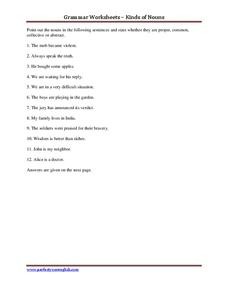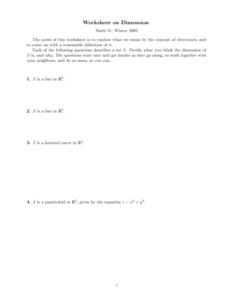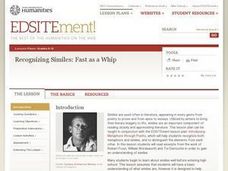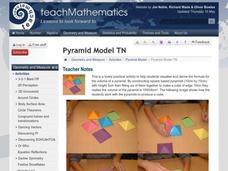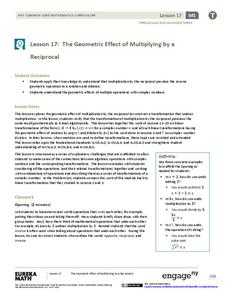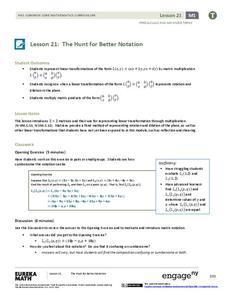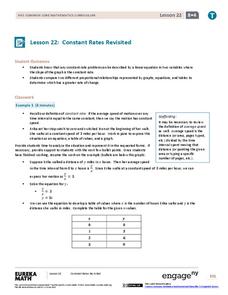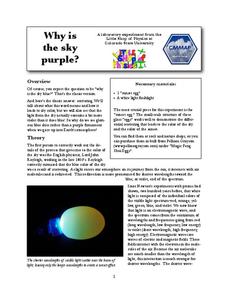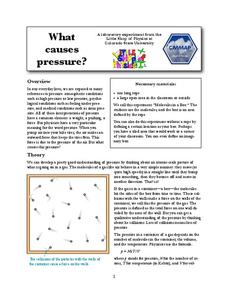Curated OER
Kinds of Nouns
In this nouns worksheet, students identify nouns in sentences and determine whether they are proper, common, collective or abstract.
Curated OER
Worksheet on Dimension
In this dimension worksheet, students describe the dimension of a line, a knotted curve, an abstract set, explore a paraboloid. This two-page worksheet contains eight problems.
Curated OER
After 15 years, Air Force gets memorial over capital
Students examine the meaning of a new air force memorial. In this reading comprehension lesson students read an article, students discuss and brainstorm abstract concepts such as sacrifice, past, present and future. They will...
Curated OER
Recognizing Similes: Fast as a Whip
Pupils review basic knowledge of similes and engage with similes on a more abstract level. In this similes lesson, students define similes and identify examples. Pupils read and analyze the similes used in poetry by Derricotte, Frost,...
Curated OER
Measuring to the Nearest Inch
Third graders use whole numbers and fractions to make connections between abstractions of the mathematical world and the real world. In this fractions and measurement lesson, 3rd graders identify, quantify groups , and measure distances....
Curated OER
Road Map Relief - Mixed Media painting
Students use road maps to create non-objective artwork.
Curated OER
Spin Art
The best part about spin art is that is demonstrates the concept of centrifugal force. Explore the magical spin of gravity as you make colorful art. This lesson idea is short, very simple, and requires a spin art machine.
Curated OER
Ancient Abstraction
High schoolers compare and debate how an ancient Greek sculpture is similar to modern art. Then they orally describe the cultural contributions of early Greek civilization and their relationship to the modern world.
Curated OER
Three-Level Reading Guide- The Apaches: People of the Southwest
A reading guide designed for Jennifer Fleischner's nonfiction text, The Apaches: People of the Southwest, provides readers with three levels of comprehension questions meant to encourage higher-level thinking.
Santa Ana Unified School District
Frida Kahlo
Before one can understand the work of Frida Kahlo, one needs to understand her life. Provide learners with background information on Frida's life as a person and a painter. The slides then provide information regarding several of her...
Jim Noble, Richard Wade & Oliver Bowles
Pyramid Model
Seeking to derive the formula for the volume of a square pyramid, geometry learners construct six square based pyramids that, when pieced together properly, form a cube. Two short videos demonstrate the relationship...
MENSA Education & Research Foundation
Pi Day Fun!
In this multi-faceted introduction to pi, participants perform a bevy of pi-related activities. Ranging from measuring household items to singing pi songs and reading pi stories, this fun and non-intimidating resource serves to bring up...
EngageNY
Perimeter and Area of Triangles in the Cartesian Plane
Pupils figure out how to be resourceful when tasked with finding the area of a triangle knowing nothing but its endpoints. Beginning by exploring and decomposing a triangle, learners find the perimeter and area of a triangle. They...
Willow Tree
Systems of Equations
Now that learners figured out how to solve for one variable, why not add another? The lesson demonstrates, through examples, how to solve a linear system using graphing, substitution, and elimination.
EngageNY
Advanced Factoring Strategies for Quadratic Expressions (part 1)
Factoring doesn't have to be intimidating. Build on prior knowledge of multiplying binomials and factoring simple trinomials to teach advanced factoring of quadratic expressions with a lesson that uses various methods of exploring the...
EngageNY
The Geometric Effect of Multiplying by a Reciprocal
Class members perform complex operations on a plane in the 17th segment in the 32-part series. Learners first verify that multiplication by the reciprocal does the same geometrically as it does algebraically. The class then circles back...
EngageNY
Getting a Handle on New Transformations 2
Use 2x2 matrices to move along a line. The second day of a two-day lesson is the 28th installment in a 32-part unit. Pupils work together to create and solve systems of equations that will map a transformation to a given...
EngageNY
The Hunt for Better Notation
The matrix — it's not just a movie. The lesson introduces the concept of 2 x 2 matrix multiplication as a way to represent linear transformations. Class members determine when a linear transformation represented as matrix...
Balanced Assessment
Fit-Ness
Serve four towns with one bus route. Pupils develop a bus route that meets certain criteria to serve four towns. They determine which of the routes would best serve all of them. Individuals then hypothesize where a fifth town should be...
EngageNY
Constant Rates Revisited
Find the faster rate. The resource tasks the class to compare proportional relationships represented in different ways. Pupils find the slope of the proportional relationships to determine the constant rates. They then analyze the...
EngageNY
Pythagorean Theorem, Revisited
Transform your pupils into mathematicians as they learn to prove the popular Pythagorean Theorem. The 16th activity in the series of 25 continues by teaching learners how to develop a proof. It shows how to prove the Pythagorean Theorem...
Federal Reserve Bank
Lesson 2: In the Aftermath
Don't wait for a crisis to get your finances together. An economics instructional activity demonstrates the importance of understanding crucial documents, banking basics, and financial tools with the focus on Hurricane Katrina in 2005...
Colorado State University
Why Is the Sky Purple?
The color of the sky depends on the time of day. Young scholars experiment with scattering different wavelengths of light to recreate the color of the sky. They observe both the longer blue wavelengths and the shorter red and orange...
Colorado State University
What Causes Pressure?
Are you feeling the pressure? Let loose a little with a kinesthetic activity that models molecular motion in a closed space! The activity varies conditions such as volume and temperature and examines the effects on molecules.
Other popular searches
- Abstract Nouns
- Abstract Art
- Concrete and Abstract Nouns
- Abstract Nouns Worksheets
- Abstract Flowers
- Abstract Art Picasso
- Abstract Expressionism
- Abstract Music
- Abstract Geometry
- Abstract Impressionism
- Abstract Drawing
- Adjectives and Abstract Nouns
